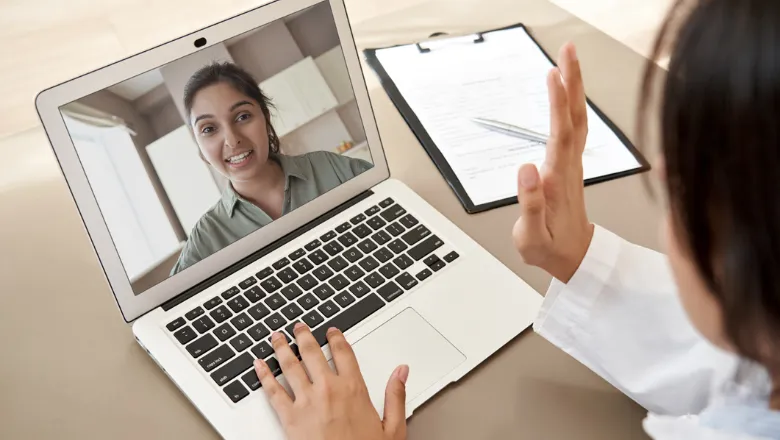It is encouraging that many patients were able to be treated remotely and that these consultations were successful. Our findings highlight the need to ensure all patients have the ability to access and use digital technology for remote consultation, as restrictions are expected to stay in place for the near future.
Dr Rashmi Patel, MRC UKRI Health Data Research UK Clinical Fellow, Department of Psychosis Studies at the Institute of Psychiatry, Psychology & Neuroscience, King's College London
31 March 2021
COVID-19 pandemic leads to rapid uptake of remote consultations in mental healthcare
Travel and social distancing restrictions due to the COVID-19 pandemic are leading to a significant shift in mental healthcare delivery, as clinicians make the switch from predominantly in-person to remote consultations, a study by King’s College London finds.

The quick shift from face-to-face to remote appointments was most apparent in children and young adults. The change was less so in older adults, who experienced a 105% increase in remote consultations between the weeks of 9 March and 8 June 2020, compared with a 262% and 298% increase for those aged under 18 and 18 to 65 years respectively. The MRC funded researchers found these changes were not associated with changes in the prescribing of psychiatric medication.
Researchers analysed electronic health records (EHRs) between 7 January 2019 and 20 September 2020 for all people receiving mental healthcare from South London and Maudsley NHS Foundation Trust. The Trust provides clinical services to around 37,500 patients each week within its catchment area, a region diverse in terms of area-level deprivation, ethnic composition and education.
Prior to the COVID-19 pandemic, video calls accounted for less than 1% of remote consultations. Since July 2020, they have accounted for around 30% indicating a rapid uptake in the use of video call software to conduct mental healthcare assessments.
He continued, “Importantly, the individuals least able to access this technology may also represent the groups most vulnerable to deteriorating mental health through the effects of isolation, unemployment, inactivity and decreased social support, all of which have been exacerbated by the COVID-19 pandemic.”
The impact on patients
In March 2020, rates of in‐person patient contact were significantly reduced compared to that in the previous year, while the number of remote contacts significantly increased.
At the same time the total number of patients registered during each week after April 2020 changed only modestly, with a maximum fall of around 2% relative to the previous year up to 1 March 2020.
The method of remote patient contact has also changed. Prior to March 2020, very few video consultations were conducted, with the majority of remote consultations being phone based. Following the start of the pandemic in March 2020, video consultations increased in frequency to reach almost 30% of all remote consultations by July 2020.
Frequencies of remote consultations were lowest in adults over 64, corresponding with a reduction in total clinical contacts during the early period of the pandemic between March and May 2020.
The researchers hope that further work will be done to ensure equity of access to remote mental healthcare consultation, particularly among older adults.
Despite how much patient consultations have changed, antipsychotic and mood stabiliser prescribing remained at similar levels.
Jessica Irving, Research Assistant in the Department of Psychosis Studies at the Institute of Psychiatry, Psychology & Neuroscience, King's College London
She added, “This suggests that changes in consultation methods have not led to substantial changes in the clinical care of mental health services, indicating that remote consultation could continue to be an important means of mental health service delivery in the years following the pandemic”.
A bespoke healthcare database
Researchers used the Clinical Record Interactive System (CRIS), a one-of-a-kind computer system that provides researchers with regulated access to anonymised information contained in medical records. Developed by the National Institute for Health Research (NIHR) Biomedical Research Centre, CRIS enables the rapid extraction and analysis of data in a vast sample of patients.
This research was funded in part by the Medical Research Council (through a Health Data Research UK Fellowship) and the NIHR Maudsley Biomedical Research Centre.
The paper Impact of the COVID-19 pandemic on remote mental healthcare and prescribing in psychiatry: an electronic health record study was published today (30 March 2021) in BMJ Open.
The Clinical events and psychotropic prescribing dashboard with data extracted up to 20th September 2020 online.
Contact
To find out more or to arrange interviews, please contact the Communications team at NIHR Maudsley BRC:
- Alex Booth, Communications and Engagement Manager, NIHR Maudsley Biomedical Research Centre, Tel 020 7848 0495 alex.booth@kcl.ac.uk
- Serena Rianjongdee, Communications and Engagement Officer, NIHR Maudsley Biomedical Research Centre, Tel 020 7848 2137 serena.rianjongdee@kcl.ac.uk
